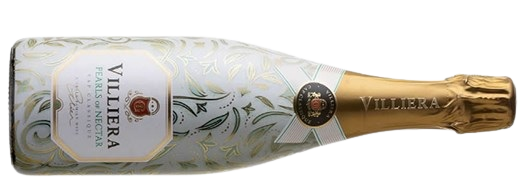Saying a hearty congratulations to some and a fond farewell to another, but there are places to go and new beverages to enjoy.
CHEERS | NEWS


News Scoop
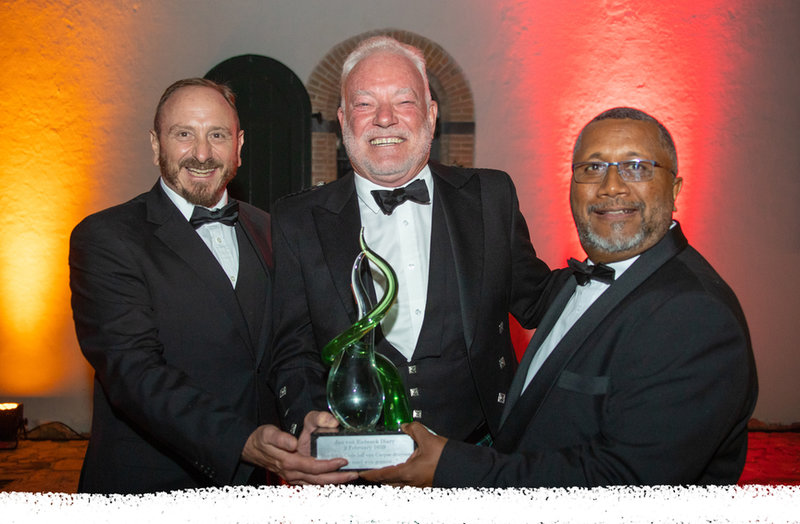
Industry awards
The South African wine industry celebrated its 364th anniversary on 2 February with an award ceremony honouring people who are making significant contributions to the industry.
Industry awards
The South African wine industry celebrated its 364th anniversary on 2 February with an award ceremony honouring people who are making significant contributions to the industry.
Held at Groot Constantia the event comprised a blessing of the wine harvest as well as the awards. Groot Constantia chairman, Dr Ernest Messina, said it was heartening to see the growth of this occasion. “Year on year more wine people from diverse backgrounds are nominated to be recognised for their work,” he said. “This is in line with our objective of honouring all who are contributing to our proud wine industry. I trust that by recognising the four 2023 honorees, others will be inspired to take the industry to even greater heights.”
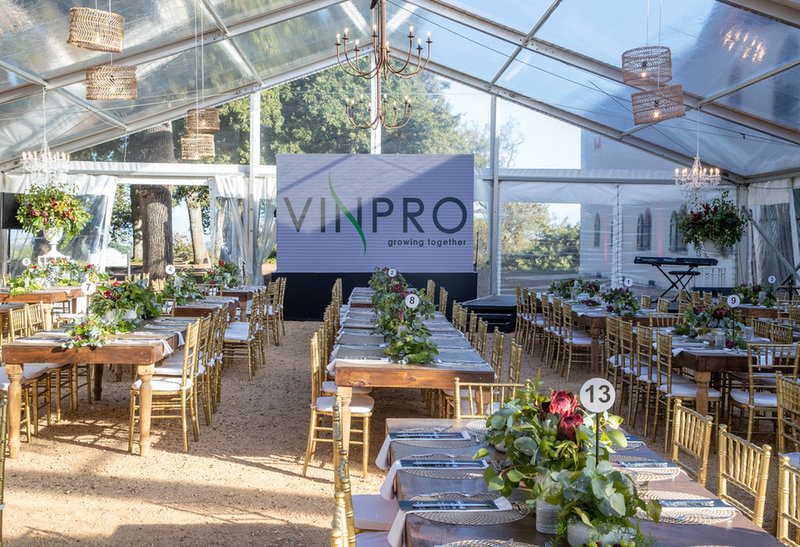
The 1659 award for visionary leadership went to Ken Forrester who not only started Ken Forrester Wines but has been a prime mover in championing the rise to prominence of chenin blanc through the Chenin Blanc Association. As the inaugural chairman of the association, he did a tremendous amount of work in promoting the grape and wine which is now recognised globally as South Africa’s de facto national white wine.
Rydal Jeftha was the honoree in the growing inclusivity category. Jeftha is the CEO and MD of Koopmanskloof Vineyards and has been for 16 years. Criteria for consideration for this award includes “setting an inspirational example, paving the way for others by eliminating barriers, contributing to knowledge that others can use, and having a generally positive impact on the image of the South African wine industry.” He is also a board member of industry bodies Vinpro and Wines of South Africa (Wosa).
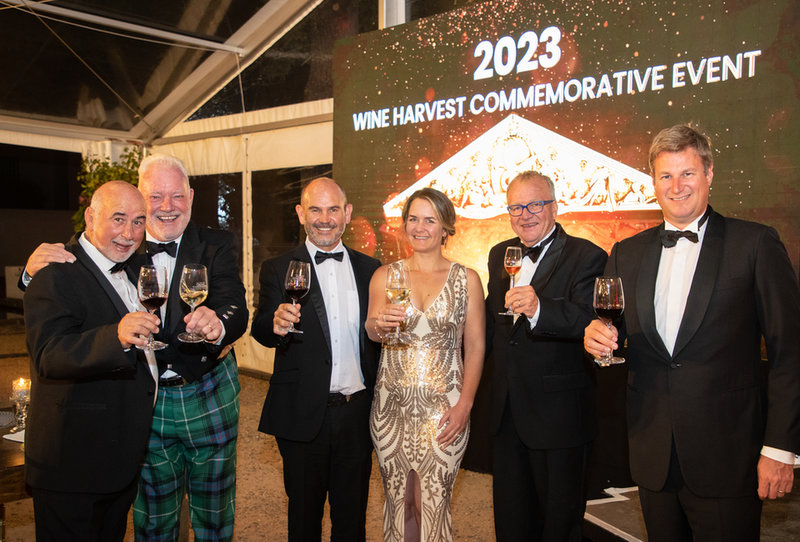
Cheers! Beyers Truter of Beyerskloof, Ken Forrester, La Motte cellarmaster Edmund Terreblanche with Dr Carien Coetzee, Graham Beck cellarmaster Pieter Ferreira and Johan de Wet of De Wetshof
Administering officer of the Liquor Products Act Wendy Jonker was recognised in the wine advancement category for the work she has done in enhancing international trade, facilitating exports and corporate good governance. “Jonker’s behind-the-scenes work has significantly contributed to opening doors for the South African wine industry internationally. Without the dedication and expertise of role players like her, the industry would find it difficult to advance consistently and sustainably,” her citation noted.
The fourth and final person honoured was Dr Erna Blancquaert for her contribution to viti-and viniculture. A lecturer in grapevine and wine sciences at Stellenbosch university, Dr Blancquaert also supervises Master’s and PhD students in viticulture and oenology, sustainable agriculture and biotechnology. She was the first black South African to receive a PhD in viticulture in 2015.

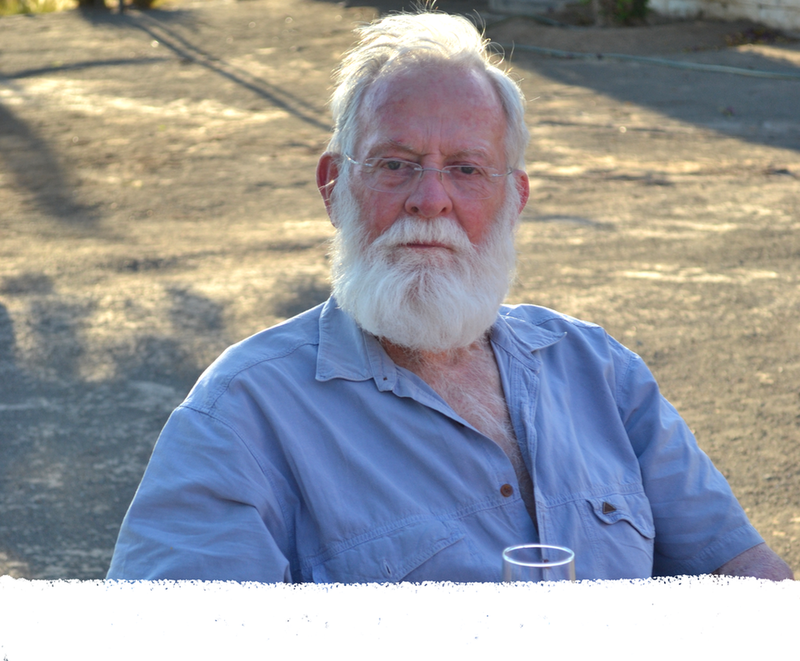
Passing of a local icon
Dave Hughes, who served as an informal consultant and mentor to both CHEERS magazine and its forerunner, Whisky magazine, died peacefully in Stellenbosch in February.
Passing of a local icon
Dave Hughes, who served as an informal consultant and mentor to both CHEERS magazine and its forerunner, Whisky magazine, died peacefully in Stellenbosch in February.
A trained distiller, former chairman of the International Wine & Spirits Competition’s judging panels, author of numerous books and founder of the Cape Wine Academy, Hughes was immensely modest and humble about his achievements.
He established the Nederburg Auction in 1975 and counted some of the greatest names in wine and spirits as good friends. It’s alleged that Hughes is responsible for the expression; “life is too short to drink bad wine” but this cannot be verified.

A friend and mentor to many, Hughes was generous with his time and encyclopaedic knowledge about all wines and spirits. “I was reminded when I took over the chairmanship of the Diners Club Winemaker of the Year from Dave, that he’d once told me years ago; know more. Not “no more” but “know more”, be in possession of a deeper understanding and knowledge to be able to appreciate what it is that you’re judging,” said Carrie Adams, a well known wine personality.
Hughes obtained his permanent green number for completing 10 Comrades marathons and the precise number of Two Oceans ultra marathons he completed is unknown. He believed in living a well rounded life and remained curious about a host of subjects until his health prevented any further travels, research or long walks.
David Louis Hughes, born 12 June 1938, in what was Rhodesia, is fondly remembered and deeply mourned by the thousands of people whose lives he touched in his inimitably gentle, caring manner.
RIP.
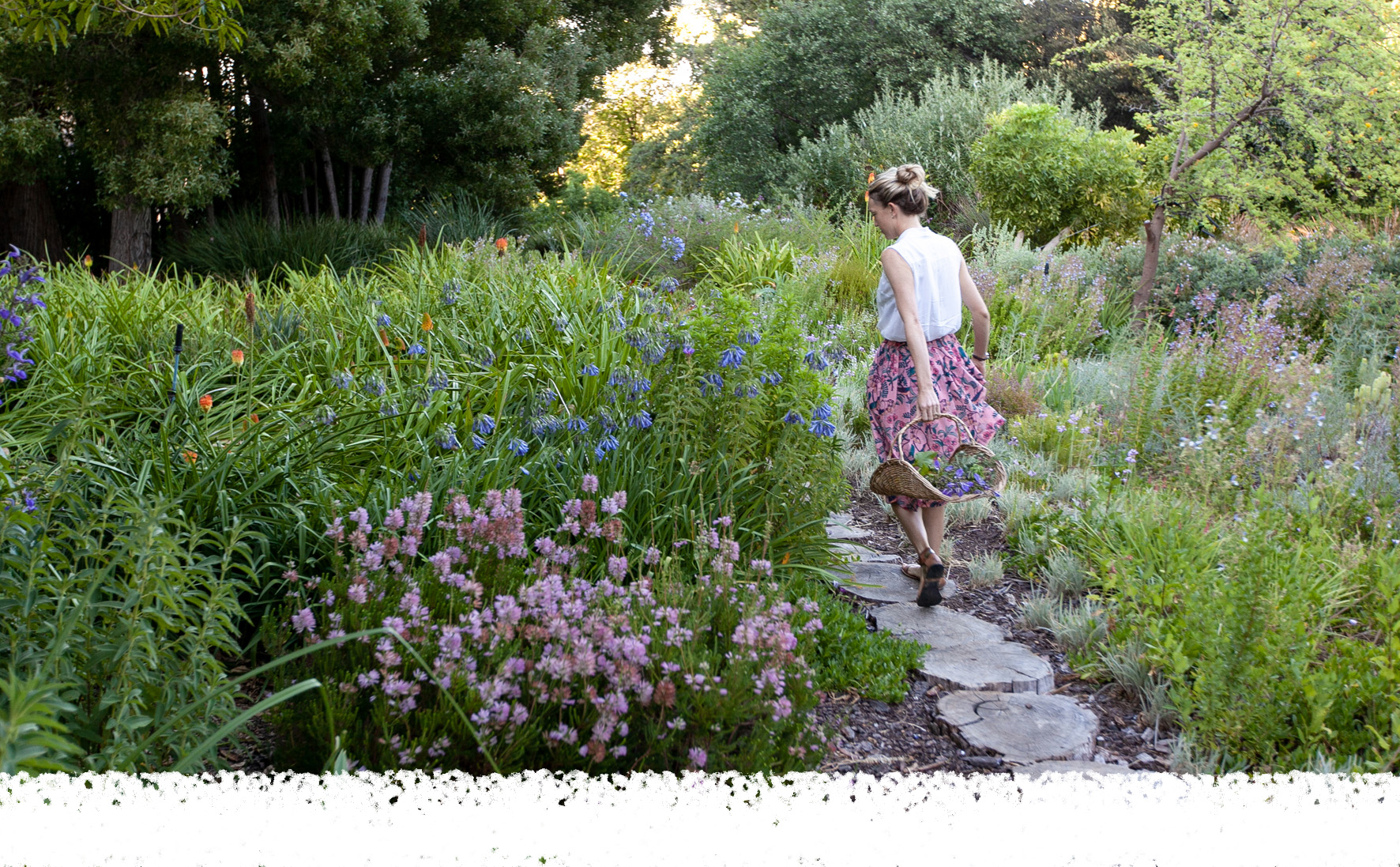
More than just great wine
Gardeners always ring this date in their calendar because the Tokara rare plant fair and open garden is a highlight of the local gardening fraternity.
More than just great wine

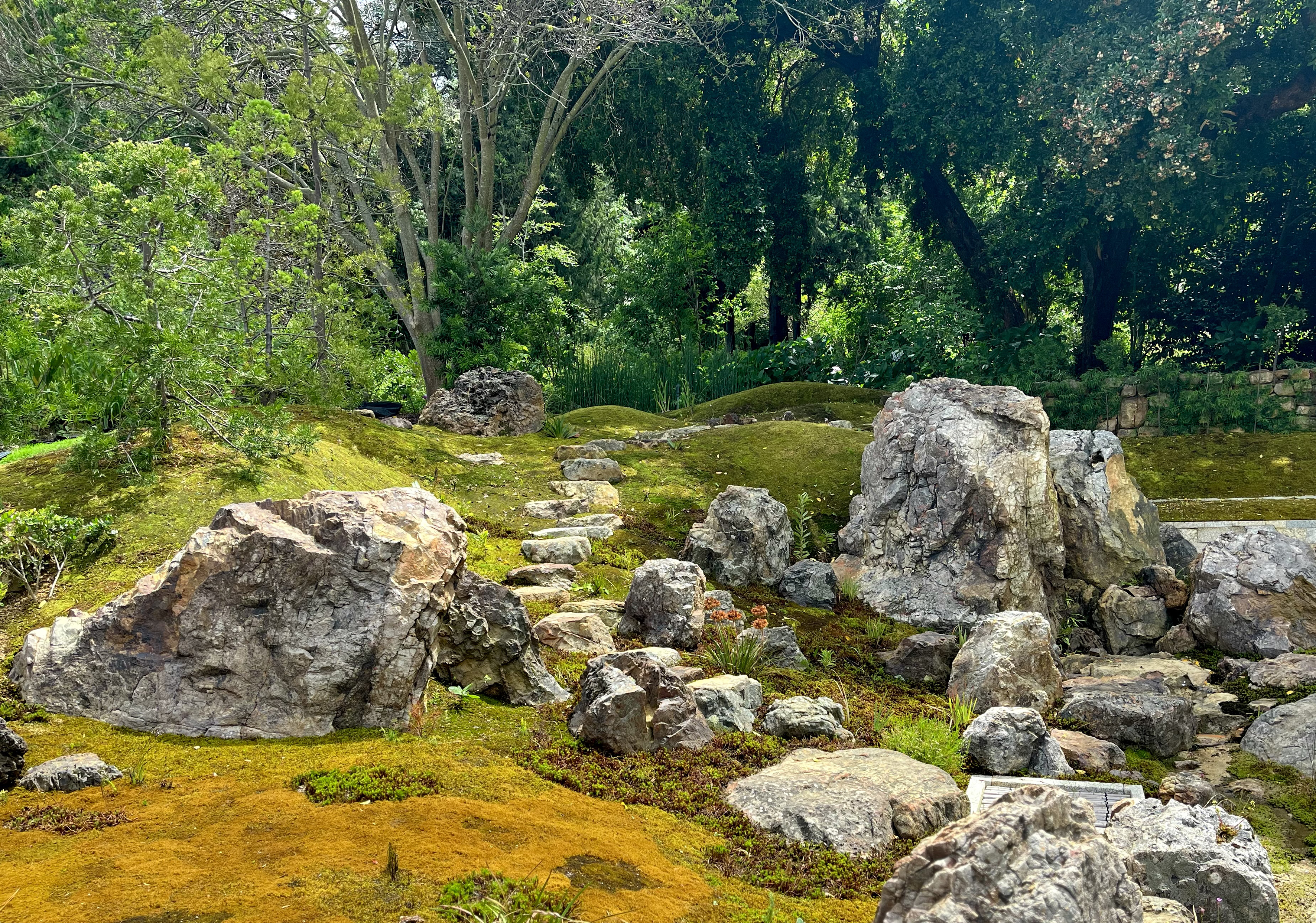
Gardeners always ring this date in their calendar because the Tokara rare plant fair and open garden is a highlight of the local gardening fraternity.
Many, in fact, use the opportunity to also visit the renowned Olive Shed and Tokara tasting room, to stock up on olive oil and top quality wines as well! It’s the one day a year that the Ferreira family open the acclaimed extensive farm garden to the public and offer special plants for sale from its own nursery.
This year Saturday 22 April is the date to note. Sculptures by local artists dot the meandering paths which were planned to make the most of the stunning mountain and valley vistas. There’s a dedicated indigenous garden, a well-stocked vegetable garden which is in daily use as well as a cork oak forest and the cut flower garden too.
The most recent addition is the indigenous Adamastor moss garden, inspired by the ancient Zen Buddhist gardens seen in Japan. It is 100% local with all rocks and moss having been sourced from within a few kilometres of its current location.
In addition to plants being on sale, the farm’s critically acclaimed and internationally awarded olive oils and wines will also be available. The Tokara rare plant fair and autumn open garden runs from 08h00 until 16h00. Entry for adults is R50 in aid of a local charity while children under 10 have free entry. For more information visit www.tokara.com or email opengarden@tokara.com.
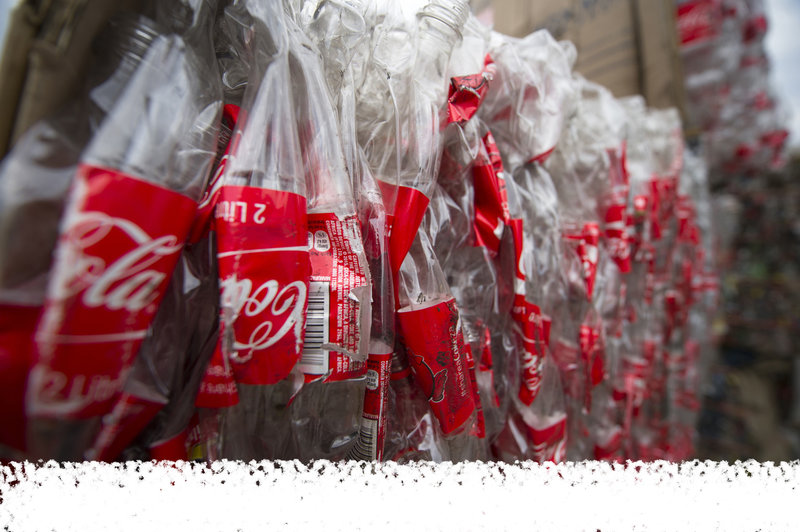
Many happy returns
Coca-Cola South Africa announced it is to roll out an innovative – returnable – refillable 2-litre PET bottle in the Free State and Northern Cape.
Many happy returns
Coca-Cola South Africa announced it is to roll out an innovative – returnable – refillable 2-litre PET bottle in the Free State and Northern Cape.
The beverage company is doing this in an endeavour to reduce environmental waste and litter, something it has already done in other provinces. It launched the refillable PET (RefPET) in the Eastern Cape, Gauteng, Limpopo, Northwest and Mpumalanga in 2019. This is now an important part of the recycling value chain the company states, as well as offering its consumers value for money.
Coca-Cola has set itself the impressive goal of helping to collect a bottle or can for every single one that it sells by 2030, to use 50% recycled content in all packaging and make 25% of its packaging reusable within the same year – and to make ALL its packaging fully recyclable by 2025.
“We’re very excited by this progressive phase of our RefPET rollout in the two provinces,” said Velaphi Ratshefola, the MD of Coca-Cola Beverages SA. “This innovation is part of our World Without Waste Vision 2030, which relies on partnerships with customers, consumers, communities, industry, and governments to succeed. Our vision and annual targets are ambitious, but our results have shown us that it is possible to make a meaningful contribution towards helping create a waste-free planet.”
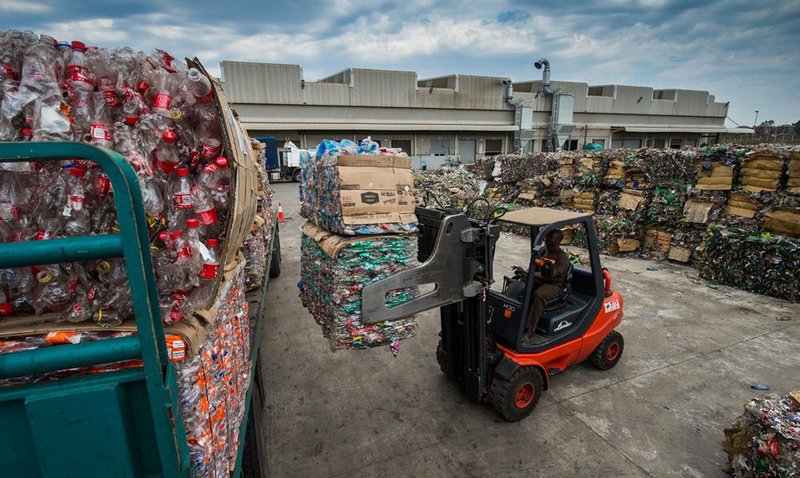
The returnable bottles are identifiable by a new paper label – with the word RETURNABLE in green on the bottle’s front. Ratshefola said the uptake of this recycling scheme in the other provinces had been heartening. “This is what we envisioned with this innovation, to encourage consumers to return the bottles for reuse, for as long as the bottle passes the quality test. We are excited about this next phase.”
Once returned – and the R9 deposit paid back to the customer – the bottle goes back to Coca-Cola, cleaned “in accordance with Coca-Cola’s stringent measures and requirements,” and then refilled.

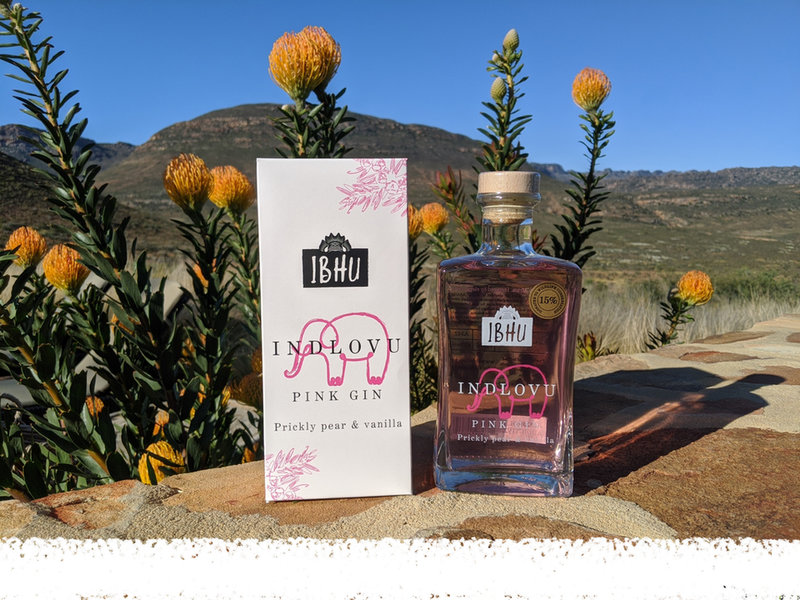
Trumpeting New York gold
Indlovu gin began as a dream started from a quirky idea – distilling gin from elephant dung! (Indlovu means elephant in several African languages.)
Trumpeting New York gold

Indlovu gin began as a dream started from a quirky idea – distilling gin from elephant dung! (Indlovu means elephant in several African languages.)
This handcrafted product has gone on to become something of a sensation because of its uniqueness and has been featured in inserts on CNN, Fox News and BBC radio, to highlight a few. Part of its appeal is that a portion of the proceeds go to elephant conservation, specifically the Hoedspruit Elephant Rehabilitation and Development Trust – or HERD. Indlovu gin is exported to the United States, Canada, countries in the European Union, Japan, Taiwan and Scandinavia.
The flagship gin, Indlovu original gin, recently won an international gold award at the prestigious New York 50 Best Gin Awards, in addition to the double gold it won at the local South African Craft Gin awards.
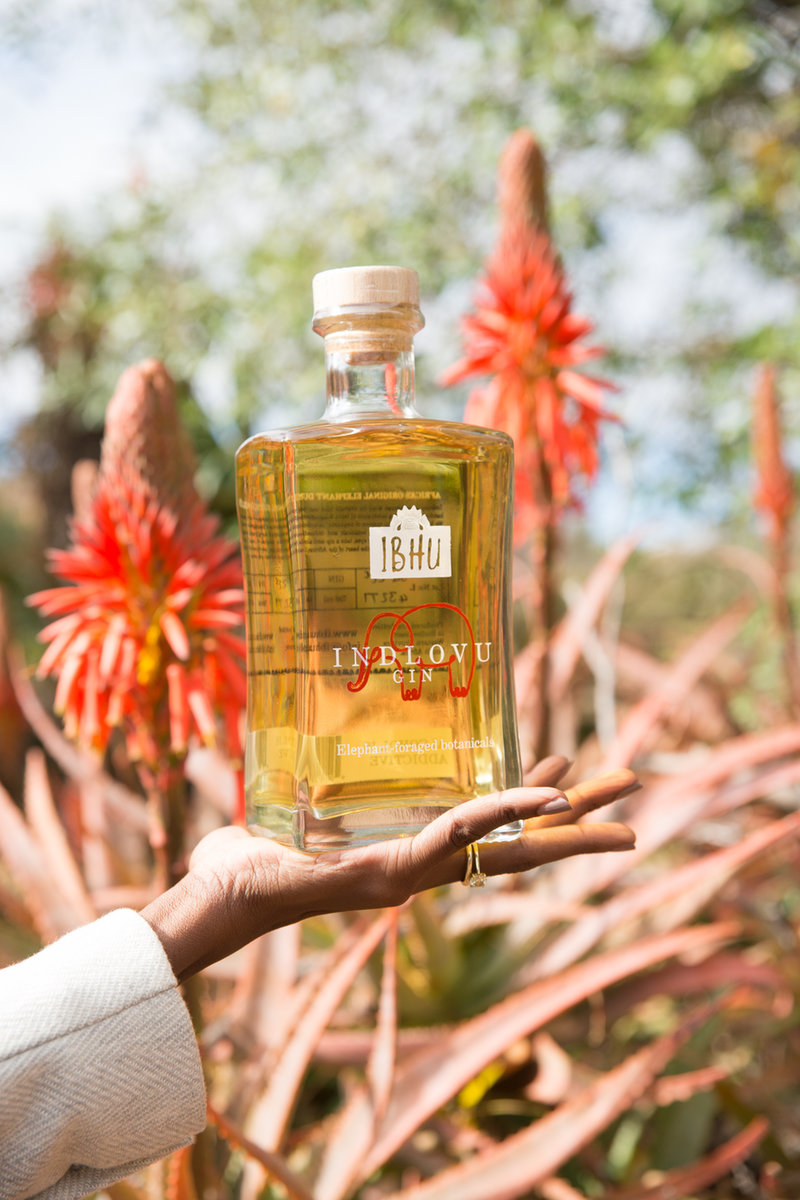
Part of the original gin’s appeal – other than it’s made with elephant dung! – is that it is infused with a host of the wild botanicals which are foraged by wild elephants. It works well as a straight gin and tonic or as the base for a host of cocktails.
Indlovu has added two range extensions to the original gin: Indlovu pink and Indlovu citrus.
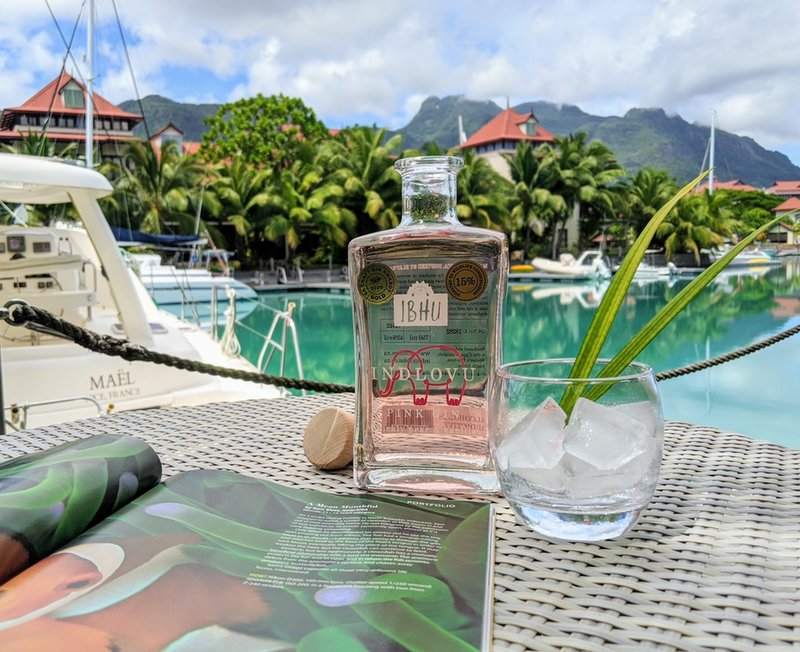
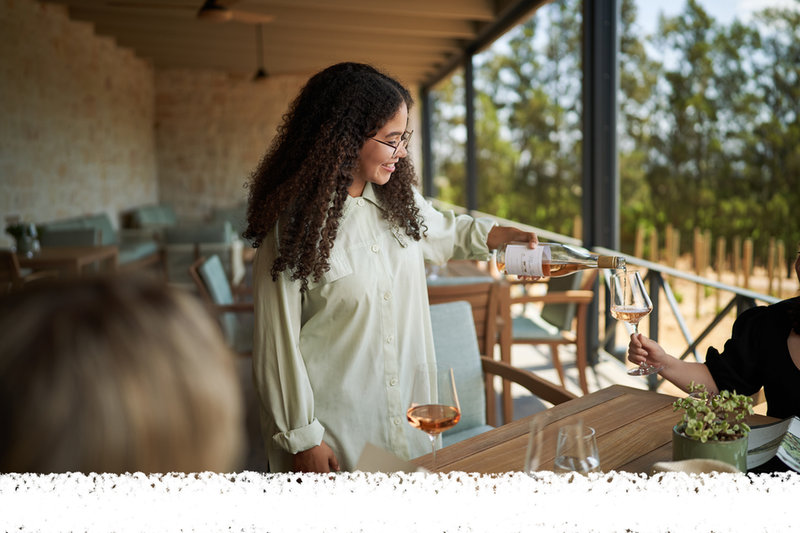
Rosé rocks!
The stigma attached to pink wine is a thing of the past. Rosé wine is now one of the fastest growing wine categories in South Africa.
Rosé rocks!

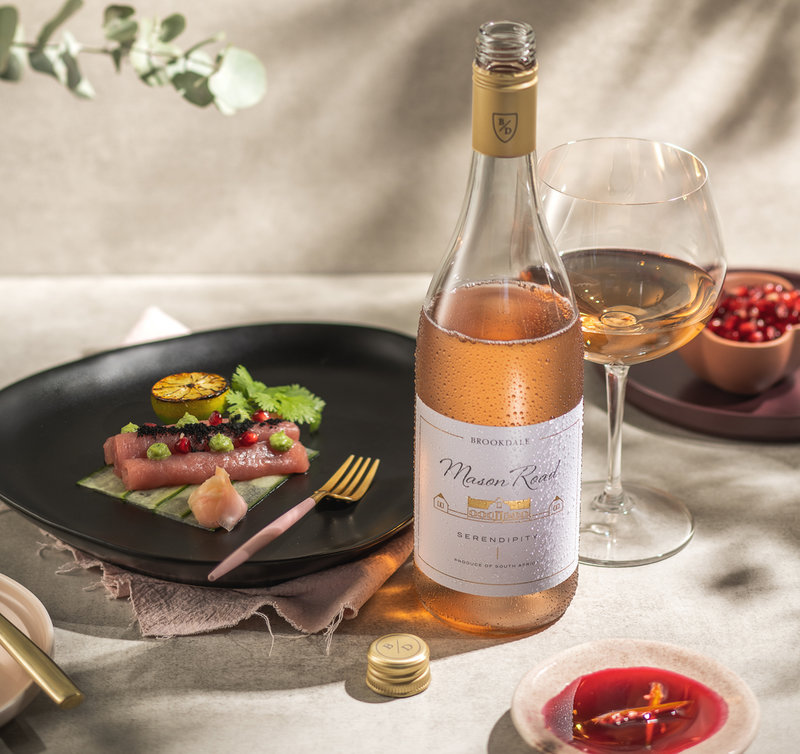
The stigma attached to pink wine is a thing of the past. Rosé wine is now one of the fastest growing wine categories in South Africa.
“Gone are the days of having rosé only at the poolside!” said Brookdale winemaker Kiara Scott. “Our South African rosés are becoming serious wines that you can enjoy with food or by itself. I love the Mason Road Serendipity Rosé because of its versatility.”
Scott said the Serendipity rosé was generous, offering up a beautiful bouquet of flavours with refreshing acidity. Furthermore, she said, a small portion of the wine was wooded which added more heft and body to the palate, providing a well-rounded mouthfeel.
The name for this rosé, Serendipity, was coined after a moment where chance and opportunity coalesced. Scott admits the wine was never planned to happen.
A single block of Grenache Noir had been planted at Brookdale in the Paarl winelands, for use in a red blend. But in 2020, when it was first harvested, proprietor Tim Rudd and Scott tasted the grapes and decided on the spur of the moment to use the entire block for an elegant rosé blend. ‘It was a complete leap of faith and the result is a summery, medium-bodied rosé as unexpected as it is marvellous. Proof that exploration of the unknown can result in something truly remarkable!’ said Rudd.
At the new Bistro at Brookdale, the Serendipity rosé is paired with a starter dish of char-grilled baby gem lettuce, with pickled red onion, avocado, croutons, capers, wakame and cashew dressing; or duck leg confit, crisp breast, sweet potato, pak choi, fine beans and ginger gastrique as main course, to name but a few.
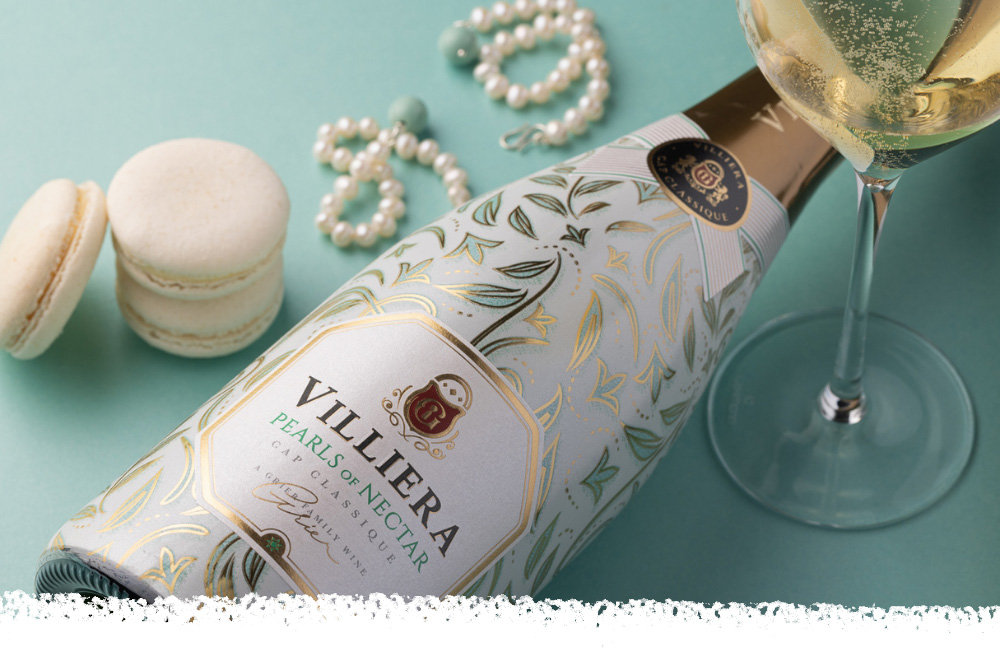
Shiny New Pearl
Cap Classique innovator Villiera of Stellenbosch stays true to form in introducing a completely new bubbly to add to its already extensive range of sparkling wines.
Shiny new pearl

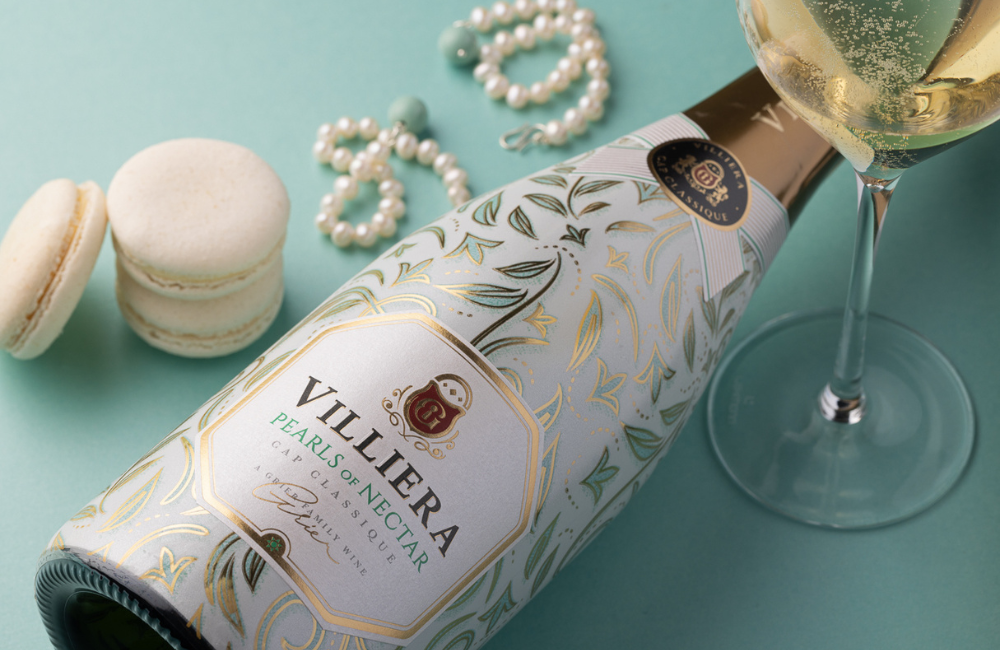
Cap Classique innovator Villiera of Stellenbosch stays true to form in introducing a completely new bubbly to add to its already extensive range of sparkling wines.
Villiera was one of the first South African wineries to take the sparkling wine category seriously with cellarmaster Jeff Grier spending time in Champagne, France, learning all he could about the bubbly stuff way back in the 80s. The first bottling of fizz was in 1984 and, until now, Villiera had five distinct styles to offer enthusiastic consumers.
New to the lineup is Pearls of Nectar, a gently sweet Demi Sec Cap Classique which is packaged in eye-catching full bottle wrap. (That’s something Villiera adopted from the Queen Bee, Bonang Matheba, since they produce the hugely commercially successful House of BNG bubbly.)
And the name? That’s a reference to the “magical string of tiny bubbles” which can be found in every glass – as well as the pearls of nectar that attract birds and insects to the host of indigenous flowers on Villiera.
